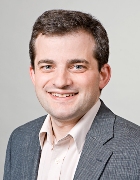
Prof. Boris Vexler
Academic Career and Research Areas
Prof. Vexler’s (b. 1977) research area is the numerical analysis of problems described with partial differential equations (PDEs). The focus of this work is on developing and analyzing efficient numerical algorithms to solve optimization problems with PDEs.
Prof. Vexler studied at Lomonosov University in Moscow and the University of Heidelberg. He obtained his doctorate at Heidelberg in 2004 and his lecturer qualification at the University of Graz in 2008. After completing his doctorate, he worked at the RICAM Institute of the Austrian Academy of Sciences in Linz and, in 2008, was appointed professor for control theory at TUM. After rejecting calls to the universities of Vienna and Düsseldorf, Prof. Vexler was appointed to the Chair of Optimal Control at TUM in 2013. He has served as speaker of the International Research Training Group IGDK 1754 since 2012 and since 2015, he has been dean of studies of the TUM Department of Mathematics.
Awards
- Award for best supervisor of the elite degree program TopMath (2018)
- Finalist in the ECCOMAS Prize for the best dissertation (2005)
- Leslie Fox Prize in Numerical Analysis, Cambridge, 2. Platz (2004)
Key Publications (all publications)
Leykekhman D, Vexler B: "Discrete maximal parabolic regularity for Galerkin finite element methods". Numerische Mathematik. 2017; 135(3): 923-952.
AbstractKunisch K, Pieper K, Vexler B: "Measure valued directional sparsity for parabolic optimal control problems". SIAM J. Control Optim. 2014; 52(5): 3078–310.
AbstractMeidner D, Vexler B: “A priori error estimates for space-time finite element approximation of parabolic optimal control problems I/II”. SIAM J. Control Optim. 2008; 47(3): 1150-1177, 1301-1329.
AbstractMeidner D, Vexler B: “Adaptive space-time finite element methods for parabolic optimization problems”. SIAM J. Control Optim. 2007; 46(1): 116-142.
AbstractBecker R, Vexler B: “Optimal control of the convection-diffusion equation using stabilized finite element methods”. Numer. Math. 2007; 106(3): 349-367.
AbstractIf you wish your profile to be changed or updated please contact Franz Langer.